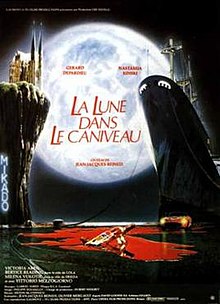Moon in the Gutter
| The Moon in the Gutter | |
|---|---|

French film poster
|
|
| Directed by | Jean-Jacques Beineix |
| Produced by |
Lise Fayolle Hubert Niogret Emmanuel Schlumberger |
| Written by |
Jean-Jacques Beineix Olivier Mergault David Goodis (novel) |
| Starring |
Gérard Depardieu Nastassja Kinski |
| Cinematography | Philippe Rousselot |
| Edited by | Yves Deschamps Monique Prim |
|
Release date
|
18 May 1983 |
|
Running time
|
137 minutes |
| Country | France |
| Language | French |
| Box office | $4.7 million |
The Moon in the Gutter (French: La Lune dans le caniveau) is a 1983 French drama film directed by Jean-Jacques Beineix. It was entered into the 1983 Cannes Film Festival.
Although it immediately followed Beineix's big, commercial success Diva and featured two very big stars, Gérard Depardieu and Nastassja Kinski, The Moon in the Gutter was not well received by critics or audiences and failed at the box office with only 625,000 admissions in France. Its vivid visual style was noted by critics. It preceded a much better-appreciated cult success from the same director, known in the US and UK as Betty Blue.
The film was based on a pulp-noir novel of the same name, written by David Goodis, but it was transferred in the film script from the docksides of Philadelphia to Marseille.
La Lune dans le caniveau, according to AllMovie, " received uneven reviews on its initial release". It won a French Cesar Award for its production design.
Two women: Loretta (Nastassja Kinski), a wealthy amateur photographer who prowls the docks in her early '60s Ferrari 250 GT California Spyder looking for handsome men, and Bella (Victoria Abril), a poor but beautiful woman who is probably a prostitute, share affections for a dock worker named Gerard (played by Gérard Depardieu). He is obsessed by the memory of his sister, who was raped and then committed suicide in a back alley, which he visits every night. No one knows who committed the rape, and he has sworn to avenge the crime, if he can only figure out who the perpetrator was.
Although the movie was a failure when first released, it had a number of cult admirers. In the mid-1980s it was often screened as a fashionable late night art movie for esoteric clubs such as the "Edinburgh Academy Cinema Society".
...
Wikipedia
